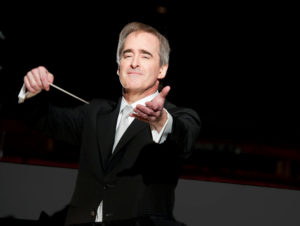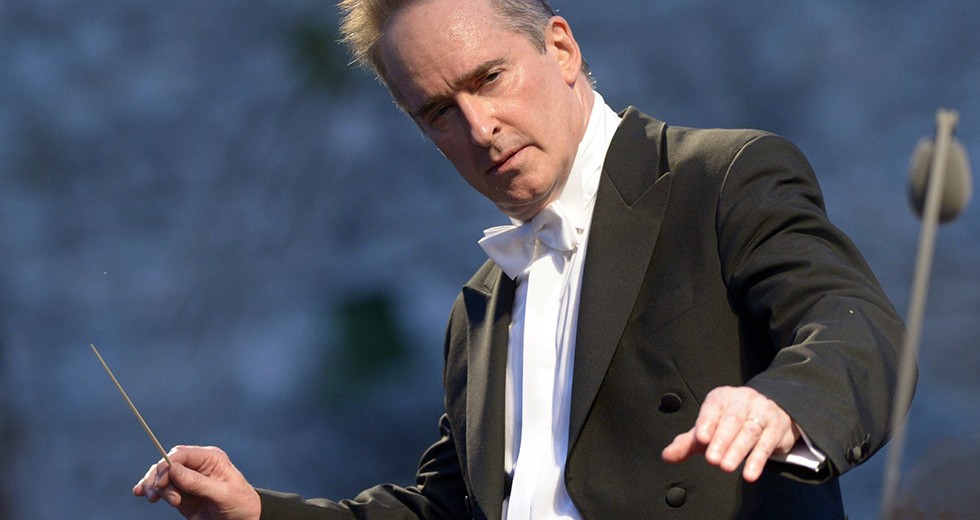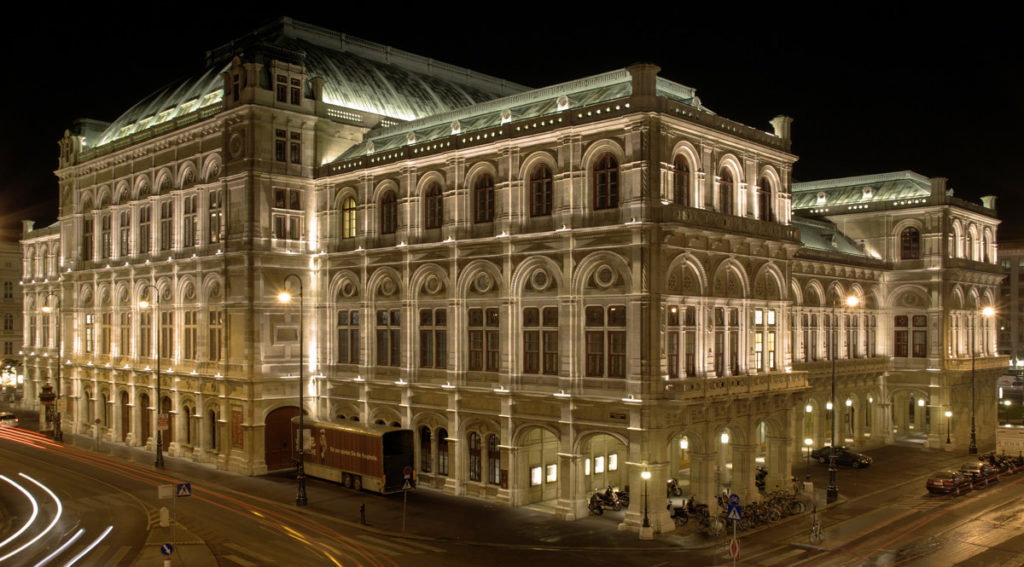One evening while working in Germany, the maestro James Conlon heard in his car the work of a Jewish composer who reminded him of why he had fallen in love with music in the first place. The Nazis called them “degenerate music,” but his life’s task is to restore these lost works alive – and he is not even Jewish. In an interview with Ynet on his arrival in Israel, he speaks of forbidden music and the excitement of it (“This is a mission that will not end even after my death”), and the discovery of the human voice.
This is surprising, but James Conlon came to Israel for the first time only now. The director of the Los Angeles Opera House and the Italian Broadcasting Authority Orchestra, who ran the Cincinnati Choir Festival and the Ravinia Festival – the summer residence of the celebrated Chicago Symphony Orchestra – and was the director of the Cologne Opera and Symphony Orchestra and Rotterdam, is at last a guest of the International Opera Workshop, which will be held on July 28 and 29 at the Tel Aviv Conservatory.
The person who brought him here is his wife Jennifer Ringo, who taught at the Opera Workshop last year. She enjoyed it so much and he always wanted to be in Israel. He came to the Israeli heat with two hats on his head. The first is to teach master classes and listen to and discover promising talents among the young singers participating in the workshop. In his other hat he came to present us with the sounds that were once called “degenerate music” – that is how the Nazis called the music composed by Jews, blacks, leftists and communists, and more. But first and foremost Conlon focuses on music created by Jews before and during the Holocaust.
“I have an Italian mother and an Irish father, and there is also some German blood but there is no Jewish blood,” he says when asked about the connection to Judaism. Conlon set himself the goal of exposing the world to music that was forbidden to be played, and that even forty years after the end of the war it was almost never played, played, or composed. The Nazis and their heirs could have been pleased that they had forgotten the music from the work tables of the orchestras and the executive bodies. But one record company, Decca, put up the first challenge, and not long after that, Conlon joined in to expose this music to audiences in America and around the world and even won prizes for his efforts.
Why do you see yourself as a representative or agent of this music?
“I’m not an agent or a representative, the music was a passion, and I see myself as a messenger … It happened to me in Germany during the time I ran the orchestra in Cologne … One rainy night after a concert, on the way home in the car, I turned on the radio and I heard music. I’ve never heard of it before, I’m not telling you that it’s the best thing I’ve ever heard, but it was music that immediately captured my heart, I fell in love with the sounds from the very first moment and I wondered what it was. When I got home, I did not turn off the engine. The composition – the magic will disappear, I did not want to lose a sound.
“When the work ended, the announcer said that the name of the piece: “The Mermaid” by Alexander Zemlinsky. I heard the name once, but not the music,” he says, adding: “The next morning I asked the orchestra’s content manager to bring me works by Zemlinsky.
What do you do with a discovery in the middle of a concert season; you will not be able to change the program
“Fortunately we had a contract with the EMI recording company and there was a discussion about what to record, I told them there was no point in re-recording the familiar repertoire Beethoven, Brahms let’s do something new. We’ll do ‘The Mermaid’ and they responded ‘Excellent, we do not have it yet.”
Conlon turned the piece into an album when he added the Sinfonietta. And before the second album he offered Zemlinsky’s “The Dwarf” opera and again received a positive answer. “My dream was to record all the operas of Zemlinsky at the Los Angeles Opera House.”
But you did not settle for Zemlinsky?
“As soon as I began to discover the traces of Zemlinsky, additional names appeared: Schreker, and the composers who wrote music in the Theresienstadt ghetto, and I asked myself what was happening to me, and the feeling was of a revelation that was coming back to me.”
“I did not know what classical music was until I was eleven, and one opera that my mom took me to see in a small production in New York revealed to me the world of music. I fell in love with Verdi, and then I fell in love with Mozart, Beethoven, and I became busy, drinking in everything. A year later, I hear this music and the same feeling of falling in love fills me again, I asked myself how it is possible? Zemlinsky, Schreker, Ullman are suddenly starting to live inside me and when they live inside me they are looking for a way out. Okay, is the audience guilty? Impossible, if we musicians do not do the same. It is the Nazis’ fault.”
Out of a sense that the Nazis succeeded in their mission to make the world forget the music that Jews created, Conlon founded the Orel Foundation in order to bring the sounds back to life. “What pushed me was if we did not do something ourselves, nothing would happen. Someone asked me how long it would take. I replied that it’s not a project, it’s a mission, and it will not end even after my death.”
In fact I should not ask you about the location of music in the history of Western music?
“I do not think I need to bring the music to the attention of the audience, I do not ask who is more important from who, Bach from Mozart, or Wagner from Beethoven, it’s just part of history and it has to be recognized. I grew up in a home of left-wing Catholics who nurtured values of social justice, protection of the rights of minorities and workers, and father fought and talked about human rights everywhere, so we cannot return the life to these artists, but to worry about doing so.”
“The second motive is historical: for me, the mandate of every historian is to reevaluate history as soon as new facts are discovered, findings that were not available to him and his predecessors, and in the wake of discovering the correctness of the known, we learned in the history of music that there are Stravinsky, Bartok, Schoenberg and his successors. A whole world we did not know about, where did all those composers come from? They sucked from the same tradition of late romanticism and set out in new directions, and this has to make us all feel better, the most important reason for me is the artistic reason. That this music even if you listen to it. And you do not know that it was forbidden, you feel its importance.”
Were there some composers who managed to escape to the United States and were absorbed there?
“Yes, Korngold and others, and if you talk about survivors you will see the absurdity, I was in London sitting at a meal with someone who was Jewish who understood music and we were talking; and later it turned out that it was Berthold Goldschmidt, a composer who managed to escape. In all the years I studied at Juilliard, in the years I had conducted at the Metropolitan Opera, I knew nothing about it and never turned to it.
And what happens in Europe where you run the Italian Broadcasting Authority Orchestra and the budget comes from the country?
“There we do these works, but the inclination is for Italian composers, so I programmed music by Leona Siniglia, a Jewish composer who hid in the infectious disease ward of the hospital, where the Nazis did not dare enter, and he hid there until someone informed the authorities about him and he was sent to the camps. It is important in northern Italy.”
Conlon, who refused to accept the Nazi nickname “degenerate music,” decided to call his mission Recovered Voices, and so he also plans to call his book on a subject that will come out in the future. As director of the Los Angeles Opera, he performed a concert in which Ullman’s “The Broken Vase” and Zemlinsky’s “The Dwarf” were performed in the United States in front of a large audience. And even went on with Braunfels and Schreker’s operas in later years. But the donors’ money was over and the opera house became more conservative. “If you ask everyone in the opera, everyone wants to do this music, but the budget dictates,” he explains. “I preserve the spirit through my lectures on this music, and I hope to continue to record Zemlinsky’s works in 2021, when the world marks the 150th anniversary of his birth.”
This is not a standard winner. These are often examined according to their work on the stage, but Conlon also publishes articles in the American press and conducts workshops before his concerts. “It’s not a conductor’s job, I see it completely as something personal, and until about 20 years ago I did not speak to an audience, even when they asked me to refuse, but since then I have changed. And now I continue on their way, and today the audience expects you to talk before concerts and I feel comfortable with it. And with the traffic problems in Los Angeles people come to the hall early so there is nearly a full audience for every lecture.”
Let’s get back to the beginning. Your first time meeting Maria Callas.
“It was one of the most significant moments in my life: I was twenty-one years old, Maria Callas was in New York teaching master classes, and Juilliard was staging Puccini’s La Boheme conducted by Thomas Schippers, one of the most important conductors in the United States. About ten days before the show, they needed a replacement. I had known the piece since I was a child when I sang in the production’s choir, and a year earlier when I was twenty, I conducted the opera at the Spoleto Festival. It was winter and Maria Callas was sitting in a rehearsal wearing her dark glasses, and she watched me for about fifteen minutes, not saying a word. The next day the school principal called me and said we decided you should be the one to fill in for Schippers. Later I learned that Callas was the one who recommended me, because there were no gimmicks in my music.”
When you stand here in Israel with young singers, what will you tell them? What are you looking for?
“I do not know in advance when I conduct operas. At the opera house I work with every singer from the lead role to the smallest role; I listen and prepare for the musical side, the way the singer produces his voice, his music. To the human voice and to the dramatic direction of the music, do not come close to conducting opera. In America in particular, something strange has happened over the last few decades where orchestra conductors and opera conductors are two different things. Klemperer, Walter, Karajan, were successful opera conductors, and of course they were also successful orchestra conductors as well.”
“The connection between the two arts is much deeper than people think, this trend began in America where there were no opera houses except the Metropolitan in New York, and then orchestras were established throughout the country. I do everything in the same master classes. I have a terrible voice, but for thirty-seven years I have been conducting a huge choir festival in Cincinnati, USA. In other words, I know the voice in every way, and when I work in a master class it is actually a reflection of what I do with a singer at the opera house. Working to make sure the audience understands the complexity of the human voice.”
Translated from Hebrew


